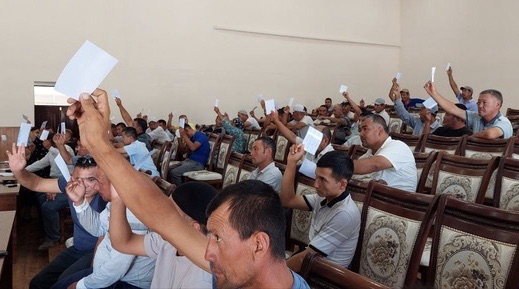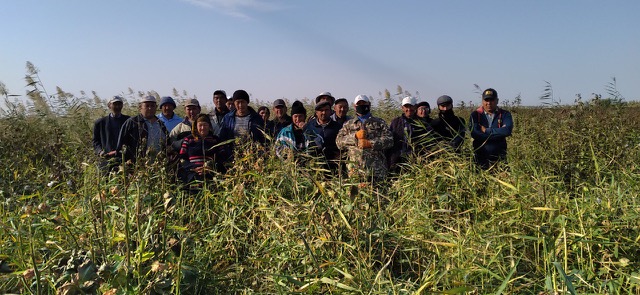Countries
Solidarity campaigns
WILL UZBEKISTAN’S FIRST DEMOCRATICALLY ELECTED TRADE UNION SURVIVE?

BY CHANGING THE STATUS OF EMPLOYEES TO “SERVICE PROVIDERS”, INDORAMA AGRO IS DECIMATING UNION MEMBERSHIP. INTERNATIONAL STAKEHOLDERS INCLUDING EBRD, IFC AND BCI MUST ENSURE COMPLIANCE WITH NATIONAL AND INTERNATIONAL LABOR STANDARDS.
On December 28, 2022, 392 workers of Indorama Agro in the Syrdarya region of Uzbekistan were told that their contracts as Nano Unit Workers (NUWs) would not be extended. Instead, they would be given new “service contracts”, whereby the former NUWs would be required to grow cotton and grain for the company for a paltry fee and assume all of the associated entrepreneurial risks. The new contracts effectively ended their employment relationship with the company although the work and activities set out in them are almost identical to those in their previous contracts.
Indorama Agro, headquartered in Singapore, received a long term lease for 40,000 hectares of land via a government decree in two regions for growing cotton, wheat and other agricultural crops and became “one of the largest cotton farms in the Republic of Uzbekistan”. The transfer of land to the company was part of the privatization of Uzbekistan’s run-down agriculture sector, conferring large swathes of land to private operators, known as clusters. Land leases were unilaterally terminated by forcing farmers to sign “voluntary” land lease terminations which gave them no right to compensation. In return, they were given promises of employment. Four and a half years later, these promises have evaporated and former farmers and workers at Indorama Agro are facing poverty and destitution.
In March 2021, workers at Indorama Agro in Syrdarya region voted in an unprecedented decision to form the country’s first democratically elected trade union. This initiative was in response to growing dissatisfaction among workers caused by mass redundancies, including poor working conditions, low wages, and abuse of civil legal contracts instead of fixed term employment contracts which deprived workers of social benefits and security of employment.
Over the last 12 months, Indorama management has attempted to marginalize an active union that has been fighting against labor rights violations. In one instance, on May 23, 2022, the company’s Syrdarya regional management, together with the local hokim and representatives of the regional Federation of Trade Unions of Uzbekistan (FTUU), organized an illegal attempt to take control of the union and install a member of management as the new chair of the union. Indorama falsely told approximately 80 workers they were going to attend a seminar and organized a sham union election, during which Ravshan Tadjiyev, who had held an executive position in the company, was “elected” chairman of the trade union. Following appeals by the existing union leaders to the head of the FTUU, as well as diplomatic interventions by the Cotton Campaign coalition, the meeting was declared invalid for violating procedures. New elections were held and a new, legitimate leader was democratically elected.
However, the very existence of the trade union has come under threat following the latest round of reclassifying workers’ contracts at Indorama Agro. In January 2022, former brigadiers – most of them former farmers whose land had been illegally confiscated – were given contracts that effectively made them responsible for the cultivation and harvest of cotton and grain in so-called Nano Units comprising 100-125 hectares of land. The brigadiers, now known as Nano Unit Workers (NUWs), retained their employment contracts and received a monthly salary, on top of which they were eligible for bonuses if they exceeded often unrealistically high production targets.
The new NUW contracts were limited to one year only and expired at the end of December 2022. On November 30, 2022, the trade union leader, Sherzod Aliboev, himself a former NUW, wrote to Indorama Agro management requesting clarity on when they could expect their contracts to be renewed but received no answer. The company refused further requests to clarify the position of the NUWs as late as December 22, 2022, one week before the contracts were due to expire. The new contracts were developed without prior consultation with the trade union in violation of the Uzbek Labor Code.
The new contracts are deeply problematic for several reasons. Firstly, they are a clear attempt to deny workers secure employment and social security. Secondly, by removing their employment status, it is highly likely that they can no longer retain their union membership, a clear attempt to prevent freedom of association and collective bargaining. Thirdly, earning potential has been significantly curtailed by reducing plots of land from 100-125 hectares to only 80 hectares. Fourthly, with a fee of only approximately $106 per month from which they are expected to cover expenses, there is an increased risk that child and forced labor may become the last resort. Finally, the company’s refusal to give sufficient notice of termination of employment has left NUWs with little or no choice but to sign up to these exploitative contracts.
These blatant violations of Uzbek national labor law and the impact on Uzbekistan’s only democratically elected trade union is a severe blow to freedom of association. As the majority of the union’s membership was composed of NUWs, this move will inevitably lead to a hollowing out of union activity just when workers need it most. This latest event follows the refusal to renew the contracts of some 300 field workers, also union members, at the end of December 2021.
WORKERS’ DEMANDS
First and foremost, the union is trying to save jobs while workers are simply demanding a living wage and decent working conditions. Indeed, according to the government decree which guaranteed Indorama Agro land and a steady supply of cotton from contract farmers, the company was expected to create 1,500 new jobs and “increase productivity and pay in the agricultural sector”. It appears therefore that Indorama Agro is not upholding its side of the deal.
Workers are demanding long-term employment contracts instead of short-term seasonal and civil legal contracts that will give them security of employment, social benefits such as a pensions and sickness benefit, and a regular fixed income. NUWs are also calling for a living wage which was previously approximately $200 per month – already a meagre amount for hard work with almost no days off – and which has now been cut by almost half. In addition, they want to see the reinstatement of access to land for private use which supplemented incomes along with access to cotton stalks after harvesting to use for heating and cooking. Given this winter’s sub-zero temperatures and appalling energy outages, such small benefits can be life saving for many rural residents.
Despite these basic demands, Indorama forged ahead with its restructuring process without discussing its plans with workers or trade union representatives. It displays a culture of disrespect for labor rights, dignity, and the right of association by transforming employees into service providers. The company is effectively now operating on bonded labor conditions having outsourced practically all of its entrepreneurial risk for cotton and wheat production.
RESPONSIBILITIES OF INTERNATIONAL STAKEHOLDERS
This latest chapter in worker-employer relations at Indorama Agro is one in a litany of labor rights violations which have been raised over the past two years directly with both company management and international development investors, the European Bank for Reconstruction and Development (EBRD) and the International Finance Corporation (IFC) who have approved loans to the company of $70 million. So far, the Banks have failed to apply sufficient pressure on the company to ensure compliance with the Banks’ own performance standards as well as the obligations of its client.
On the contrary, at the end of 2022, the Banks began disbursing the loans which had hitherto been postponed pending improvements in the company’s Environmental and Social Action Plan. Prompted by interventions by Uzbek Forum and Bankwatch Network, EBRD and IFC dispatched two fact-finding missions to Indorama Agro’s operations in 2022 but have thus far refused to disclose their findings. It is therefore impossible to verify upon what grounds the decision to disburse the loans was made.
Since 2017, IFC has supported a program for sustainable cotton supply chain development for Uzbek cotton companies, including Indorama Agro, based on Better Cotton Initiative (BCI) principles. BCI’s mission is “to help cotton communities survive and thrive, while protecting and restoring the environment“. Cotton produced in accordance with BCI standards is also stipulated in the government decree granting Indorama Agro land and cotton supply.
BCI claims to be “the architects of multi-stakeholder commitment and “the guardians of the farmer-centric approach “. In addition, it’s Decent Work Principle requires licensees to uphold international labor rights standards. Now that BCI has launched its program in Uzbekistan, they have all the means at their disposal to verify if these standards are being upheld. BCI lately came under intense criticism for its failure to identify BCI licensees operating in Western China linked to widespread, systematic forced labor and it is becoming increasingly difficult to see how they can reconcile these serious violations at Indorama Agro with their certification criteria. Moreover, BCI should pro-actively support workers’ demands and provide effective remedy.
Rather than addressing workers’ complaints, Indorama has instead embarked on a PR campaign to counter the growing unrest among farmers, workers, and rural communities in Syrdarya and Kashkadarya. In an Indorama Agro newsletter from September 2022, the company claims that BCI representatives “finished their visits to Syrdarya with a good note”. The same newsletter also claims that the Labor Department had even felt compelled to offer its thanks to the company for maintaining cordial labor relations during the cotton harvest as well as receiving a “letter of gratitude” from a human rights group in the region.
The evidence is mounting that Indorama Agro’s operations throughout the four districts they are operating in have resulted in significant discontent among workers and local communities who say that instead of creating the 1,500 jobs they committed to, the company’s policies are driving more and more rural residents to seek work abroad. Farmers whose land was illegally confiscated on the promise of employment look on in despair as they watch yields plummet through company mismanagement but which they are now expected to increase in order to earn anything close to a living wage.
International lenders and stakeholders such as EBRD, IFC and BCI have gone out on a limb with Indorama Agro by supporting a company which has had complaints filed against it in the past for serious rights abuses including the use of child and forced labor in its supply chains and violations of freedom of association. These stakeholders must demonstrate that they take their rights commitments seriously and ensure that the company reinstates the almost 400 workers who Indorama now classifies as “service workers” as permanent employeesandbegin immediate negotiations with workers and the trade union. Failure to do so would not only seriously undermine the credibility of their own policies and performance requirements, but abandon Uzbek workers who were supposed to benefit from the Indorama Agro project.
Source: Uzbekforum.org

